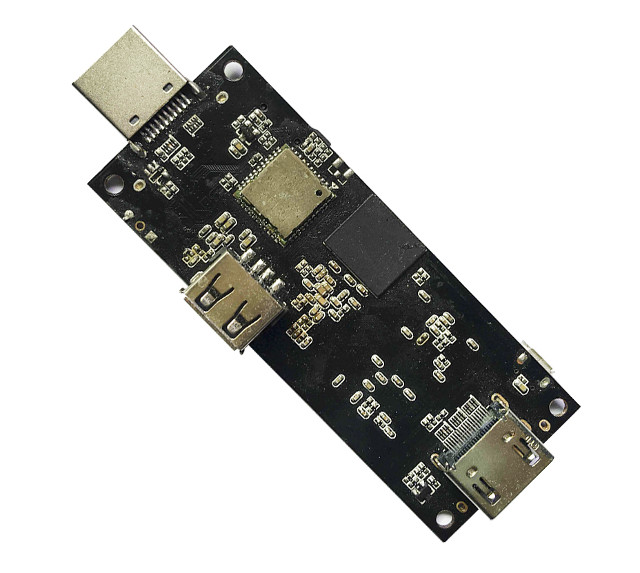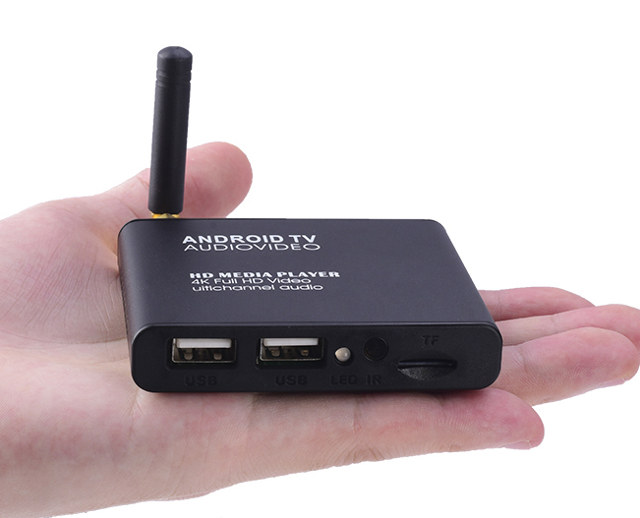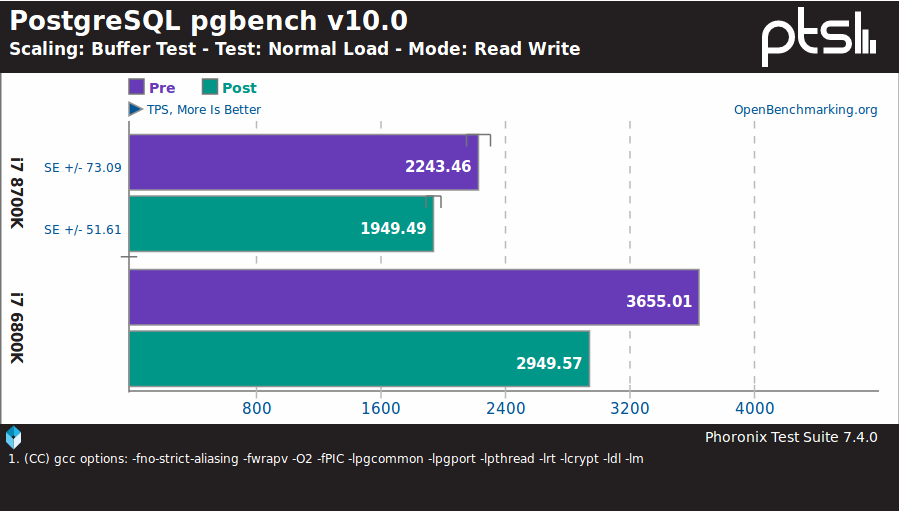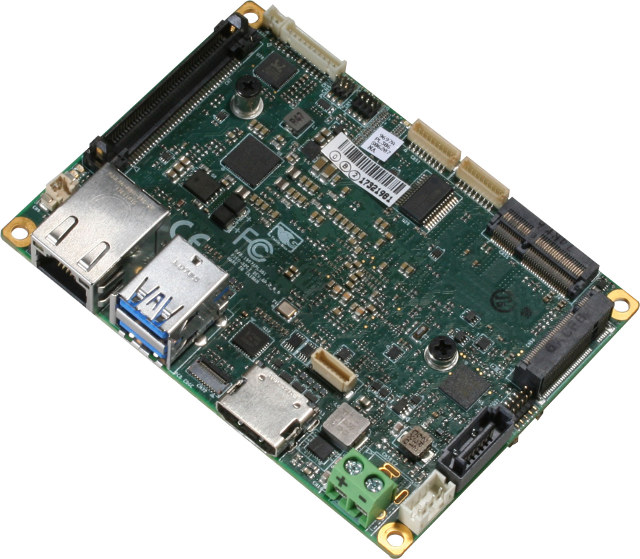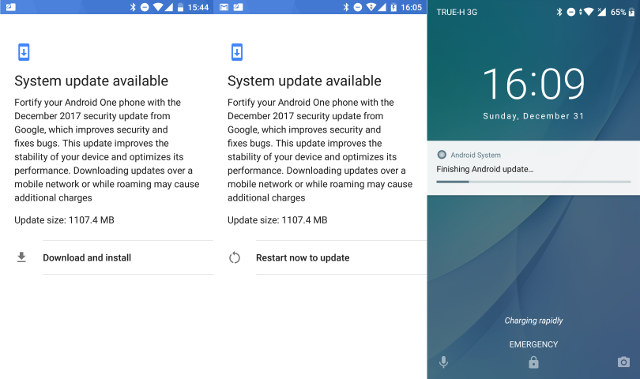Realtek RTD1295 processor is found in mid to high end 4K HDR TV boxes with interfaces like SATA, USB 3.0, as well as HDMI input used for PiP or video recording features. Devices equipped with the processor that come to mind include Zidoo X9S or EWEAT R9 Plus TV Box + NAS, both of which are full featured and fairly large devices, running Android 6.0 and OpenWrt. Shenzhen Tomato has unveiled another type of device based on RTD1295 processor: X2 HDMI TV dongle that features both HDMI output & HDMI input ports, and runs Android 6.0 (but not OpenWrt). X2 TV stick specifications: SoC – Realtek RTD1295 quad core Cortex A53 processor @ 1.40 GHz with ARM Mali-T820MP3 GPU System Memory – 1 or 2GB DDR4 Storage – 8 or 16GB eMMC flash + micro SD slot Video & Audio I/O – HDMI 2.0a output, and HDMI 1.4 input Video […]
SRH-X5 is a Palm-sized Android TV Box based on Amlogic S905W Processor
Amlogic S905W processor is a cost down version of S905X processor limited to 1080p60 / 4K30 video output and found in low cost TV boxes such as Tanix TX3 or X96 Mini that sells for just above $20 shipped. SRH-X5 is yet another of those boxes, but the device is more compact than the ones of competitors I’ve seen, as they’ve not included interfaces such as Ethernet or optical S/PDIF, and it could fit into the palm of your hand (although it’s not meant to be). SHR-X5 TV box specifications: SoC – Amlogic S905W quad core Arm Cortex-A53 @ up to 1.5 GHz with penta-core Mali-450MP GPU System Memory – 1 GB DDR3 (2GB optional ) Storage – 8GB eMMC flash (Up to 32GB as option) + micro SD card slot up to 32GB Video Output – HDMI 1.4 output Audio – 3.5mm headphone jack with stereo output/microphone, HDMI audio output […]
Intel Hardware Security Bug Fix to Hit Performance on Windows, Linux…
Many security bugs can be fixed without performance penalty , but according to reports Intel processors have a hardware bug – whose details have not been disclosed yet (embargo) – that seems to affect all operating systems including Windows, Linux, Mac OS, etc…, and the fix may lead to significant performance hits for some tasks. We know a bit more thanks to the Kernel Page Table Isolation (KPTI) patch for Linux that enables the fix/workaround with X86_BUG_CPU_INSECURE feature. The fix used to be called KAISER, and there’s an explanation on LWN about “hiding the kernel from user space” about the issue: On contemporary 64-bit systems, the shared address space does not constrain the amount of virtual memory that can be addressed as it used to, but there is another problem that is related to security. An important technique for hardening the system is kernel address-space layout randomization (KASLR), which randomizes […]
PICO-APL3 Apollo Lake Pico-ITX Board Comes with an Optional TPM 2.0 Module
AAEON has launched another industrial Pico-ITX board powered by Intel Celeron/Pentium Apollo Lake processors with their PICO-APL3 Pico-ITX single board computer featuring either Celeron N3350 or Pentium N4200 processor together with 2 to 4GB soldered DDR3L memory, and 16 to 64 GB eMMC flash. The company explains that one of key differences against other similar board is the option for a TPM module / hardware security that would allow applications such as payment processing for retailers or on the go. AAEON PICO-APL3 board specifications: SoC Intel Celeron N3350 dual core Apollo Lake processor @ up to 1.10/2.40GHz with 12EU Intel HD Graphics 500; 6W TDP Intel Pentium N4200 quad core Apollo Lake processor @ up to 1.10/2.50GHz with 18 EU Intel HD Graphics 505; 6W TDP System Memory – 2GB DDR3L on-board (Option to 4GB) Storage – 16GB eMMC flash (32/64 GB as option), 1x SATA III port (5V/12V power), […]
LittleFS is an Open Source, Low Footprint, Resilient File System Designed for Tiny Devices
Most devices need to store data either configuration files, sensor data firmware updates, and while it’s in theory possible to write directly to the storage device, it’s normally not a good idea to do so due to issues such as wear, which could lead to a premature death of your storage… LittleFS is an open source file system specifically designed for small devices such as IoT nodes for SPI NOR flash and SD card storage, and introduced in Mbed OS 5.7. The “high-integrity embedded file system” is resilient to power-cuts, supports wear-leveling, and comes in a small memory and storage footprint. Mbed support both FAT and LittleFS, so the latter was compared to the former with the following key highlights: Footprint – Code for LittleFS takes 13KB less storage than FAT, and 4KB less RAM Power loss resilience – The file system has strong copy-on-write guarantees, and storage on disk […]
Xiaomi Mi A1 (Android One) Smartphone Gets Android 8.0 OTA Firmware Update
Google gave a new life to its Android One program last year with products such as Xiaomi Mi A1 smartphone, which also happens to be my main phone. One of the main benefits of getting an Android One smartphone is the promise to get regular security updates, as well as upgrades to the latest version of Android for at least 2 years after launch. I’ve been keeping track of updated in my long term review of Xiaomi Mi A1, and since I received it in mid-October, I got 6 security updates, or about two such update per month. However, Xiaomi also promised Android 8.0 Oreo update by the end of the year (2017), and as the year drew to a close I was not confident the company would fulfill this promise. But around mid-afternoon on December 31st, I received a notification about “Android Update (Oreo)”, so I went there, […]


